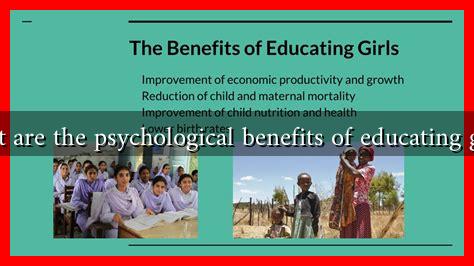-
Table of Contents
The Psychological Benefits of Educating Girls
Education is a fundamental human right and a powerful tool for personal and societal transformation. While the benefits of educating girls are often discussed in terms of economic growth and social development, the psychological advantages are equally significant. This article explores the myriad psychological benefits that arise from educating girls, highlighting how education fosters mental well-being, self-esteem, and resilience.
Empowerment and Self-Esteem
One of the most profound psychological benefits of educating girls is the empowerment it provides. Education equips girls with knowledge and skills, enabling them to make informed decisions about their lives. This empowerment translates into increased self-esteem and confidence. According to a study by the World Bank, girls who receive an education are more likely to believe in their capabilities and pursue their goals.
- Increased Self-Worth: Education helps girls recognize their value and potential, leading to a stronger sense of self-worth.
- Leadership Skills: Educated girls are more likely to take on leadership roles in their communities, further enhancing their self-esteem.
- Decision-Making Abilities: Education fosters critical thinking, allowing girls to make better choices regarding their health, careers, and relationships.
Improved Mental Health
Education has a direct correlation with mental health. Studies have shown that educated individuals tend to experience lower levels of anxiety and depression. For girls, education can serve as a protective factor against mental health issues.
- Access to Resources: Educated girls are more likely to seek help and access mental health resources when needed.
- Social Support Networks: Schools provide a social environment where girls can build friendships and support systems, which are crucial for mental well-being.
- Resilience: Education fosters resilience by teaching coping strategies and problem-solving skills, enabling girls to navigate life’s challenges more effectively.
Breaking the Cycle of Poverty
Educating girls is a powerful tool for breaking the cycle of poverty, which has significant psychological implications. When girls are educated, they are more likely to secure better-paying jobs, leading to financial independence and stability.
- Future Opportunities: Educated women are more likely to invest in their children’s education, creating a positive feedback loop that benefits future generations.
- Reduced Stress: Financial stability reduces stress and anxiety, contributing to better mental health outcomes.
- Community Impact: Educated women often engage in community development, fostering a sense of belonging and purpose.
Case Studies and Statistics
Numerous case studies illustrate the psychological benefits of educating girls. For instance, a report by the United Nations Educational, Scientific and Cultural Organization (UNESCO) found that each additional year of schooling for girls can increase their future earnings by up to 20%. This financial empowerment not only boosts self-esteem but also enhances mental well-being.
Furthermore, a study conducted in Bangladesh revealed that girls who completed secondary education were 66% less likely to marry before the age of 18. This delay in marriage allows for greater personal development and reduces the psychological stress associated with early marriage and childbearing.
Conclusion
Educating girls is not just a matter of social justice; it is a crucial investment in the psychological well-being of individuals and communities. The empowerment, improved mental health, and economic opportunities that arise from education create a ripple effect, benefiting not only the girls themselves but also their families and societies at large. As we continue to advocate for gender equality in education, it is essential to recognize and promote these psychological benefits, ensuring that every girl has the opportunity to learn, grow, and thrive.
For more information on the importance of educating girls, visit UNICEF’s Girls’ Education page.

